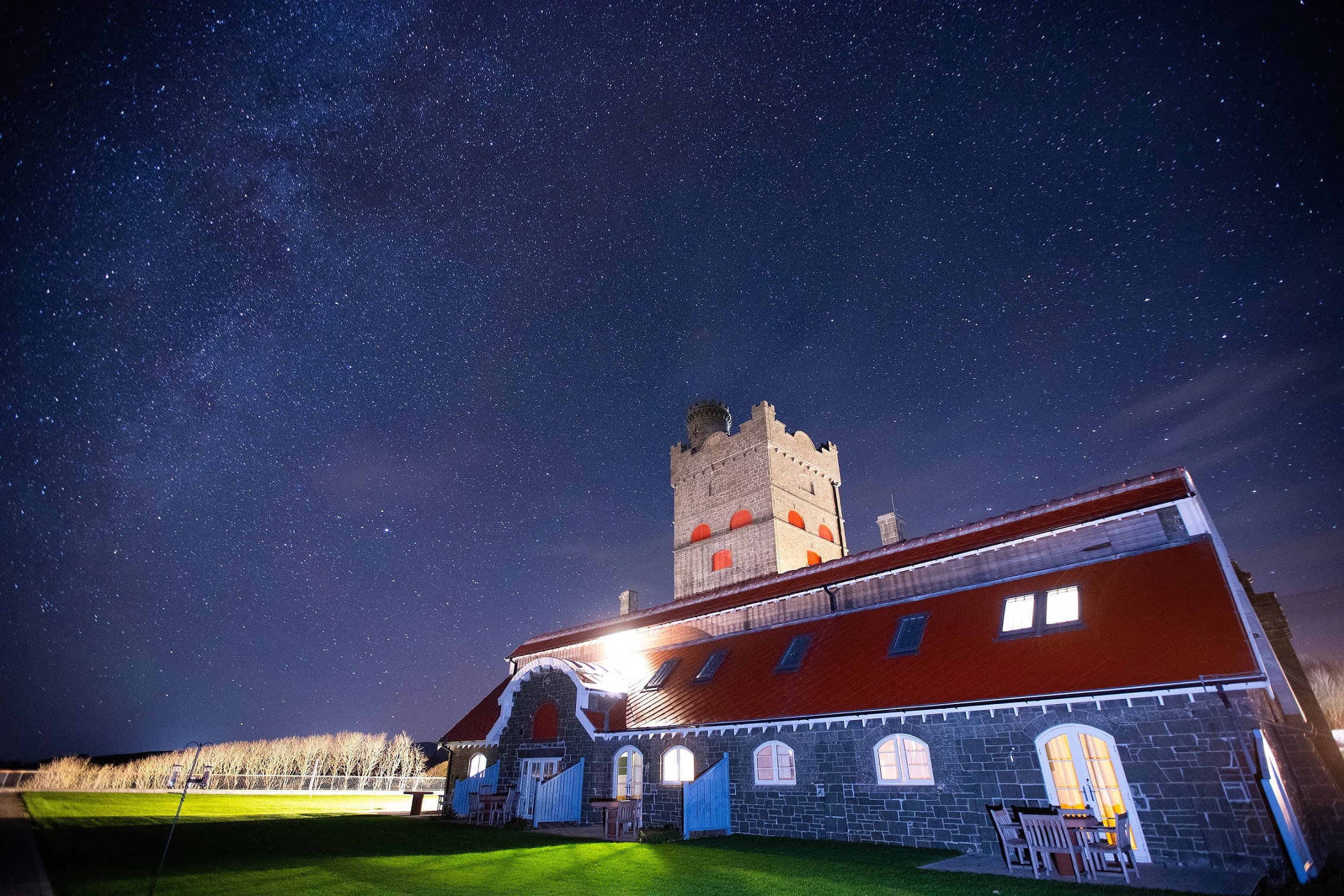
From distant galaxies to meteor showers and the shimmering wave of the Milky Way, stargazing brings the beauty of the universe into clear view. Fortunately, some of the UK’s best places to explore the cosmos are just a stone’s throw from HPB locations. Whether you are an experienced astronomer or a curious beginner, these exceptional stargazing spots promise a night to remember.
Dumfries & Galloway: The Scottish Dark Sky Observatory
Located just an hour and 15 minutes from Coo Palace, the Scottish Dark Sky Observatory sits on the edge of the Galloway Forest Dark Sky Park; one of the darkest and clearest skies in the UK. This world-class facility offers:
- A fully robotic 20” Dall-Kirkham telescope in a five-metre dome.
- A roll-off roof observatory with a 14” Schmidt Cassegrain Telescope.
- A digital planetarium, outdoor observation deck, and even moon rock in the museum!
Whether you’re gazing through a telescope or admiring the heavens with the naked eye, the observatory’s Night Sky Experience events (from £16 for adults, at time of writing) are a brilliant way to learn about constellations, planets, and cosmic phenomena from enthusiastic experts.
Top Tip: Stargazing is weather-dependent. Be sure to check the forecast and dress warmly – even in summer, nights can get chilly in the Scottish hills.
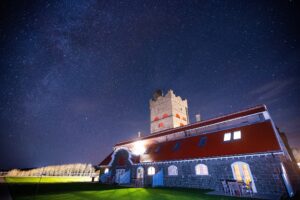
Keen astronomers staying at Coo Palace also won’t want to miss a trip to the Kirkcudbright Dark Space Planetarium, just 25 minutes from site. Adults and children alike will have a wonderful time exploring the interactive exhibits and learning about space exploration, our solar system and space technology. The centre features an immersive 360 dome, which regularly hosts expert talks and special events. Find out more at their website.
Yorkshire Dales: Dark Skies Discovery Sites
With minimal light pollution and sweeping views of the sky, the Yorkshire Dales National Park is a certified stargazing haven. Just 10 minutes from the Kings Arms Hotel, you’ll find one of several official Dark Sky Discovery Sites, including:
- Hawes National Park Centre
- Malham National Park Centre
- Tan Hill Inn (Britain’s highest pub – perfect for a pint and a planet or two!)
- Buckden Car Park
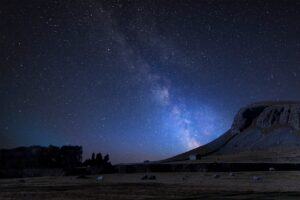
On a clear night, it’s possible to see over 2,000 stars with the naked eye. Look out for the Milky Way, the International Space Station, and, if you’re really lucky, the elusive Northern Lights, which have made more frequent appearances in the UK in recent months . There is also the chance to catch meteor showers like the Perseids or Geminids as they streak across the sky.
Did You Know? Stargazing workshops and the annual Dark Skies Festival offer guided night walks, astrophotography sessions, and family-friendly activities.
Devon: Norman Lockyer Observatory
Just 15 minutes from Lower Knapp Farm, Norman Lockyer Observatory combines historic charm with cutting-edge science. Named after the Victorian astronomer who discovered helium in the sun, this Sidmouth-based observatory is a treasure trove for space enthusiasts.
Highlights include:
- Historic instruments like the Lockyer Telescope, Kensington Telescope, and McClean Telescope.
- The James Lockyer Planetarium, offering presentations on celestial bodies and space science.
- A beautifully restored 19th-century orrery (mechanical model of the solar system).
- The Lockyer Technology Centre, part of a European meteor detection network.
Though not open daily, the observatory hosts regular open days featuring talks, tours, and hands-on astronomy experiences. Prices (as of last listing) were £10 for adults and £5 for children.
Pro Tip: Open day schedules can be found on the observatory’s website. No booking is necessary – just turn up and pay at the door.
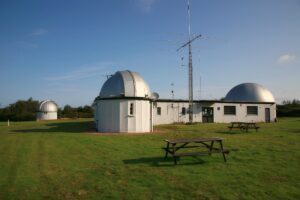
Northumberland International Dark Sky Park
If you’re staying at Lucker Hall, you’re within easy reach of one of Europe’s most exceptional stargazing destinations – the Northumberland International Dark Sky Park. Covering nearly 580 square miles, it is the largest protected area of night sky in Europe and one of only a handful to be awarded Gold Tier status by the International Dark Sky Association. This means it offers incredibly dark skies with minimal light pollution, creating the perfect conditions for spotting stars, planets, and deep space phenomena.
Whether you’re a seasoned astronomer or simply curious about what lies above, there are plenty of ways to enjoy the celestial show here. On a clear night, you can expect to see thousands of stars sparkling overhead, including the spectacular Milky Way, the Andromeda Galaxy, and even the occasional meteor.
Where to Go
If you’re willing to drive, there are two excellent observatories located within the park, both offering regular public events and expert guidance:
- Kielder Observatory – Perched high in the hills above Kielder Water, this award-winning facility offers a full calendar of stargazing events, including night sky tours, lunar viewings, and deep space observing nights. Sessions are led by knowledgeable astronomers who make the wonders of the universe accessible to all.
- Battlesteads Observatory – Located near Wark, this eco-friendly observatory is a great choice for beginners. It’s affiliated with a hotel, so you can enjoy a meal or warm drink after your skywatching session. Events here are relaxed, informative, and ideal for families or those new to astronomy.
Getting the Most From Your Stargazing Break
Wherever you stay with HPB, stargazing is an accessible and inspiring way to connect with the natural world. Here are a few handy tips:
- Choose a clear, moonless night for the darkest skies.
- Wrap up warm – layers, blankets, and a hot drink are recommended.
- Bring a red-light torch (or cover a normal one with red paper) to preserve your night vision.
- Use apps like Sky Map or Star Walk to help identify stars and planets.
- Be patient. It takes 15–20 minutes for your eyes to fully adjust to the dark.
From the rugged hills of Scotland to the rolling Dales and the scenic coast of Devon, HPB properties offer not just relaxing getaways, but front-row seats to one of nature’s greatest shows. Whether you explore an observatory or simply step outside and look up, stargazing near HPB sites is an experience that will stay in your memories long after the sun has risen.
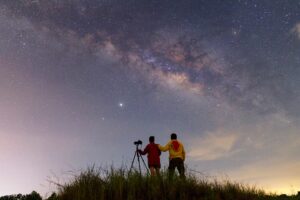
Please find out more the way that suits you…




